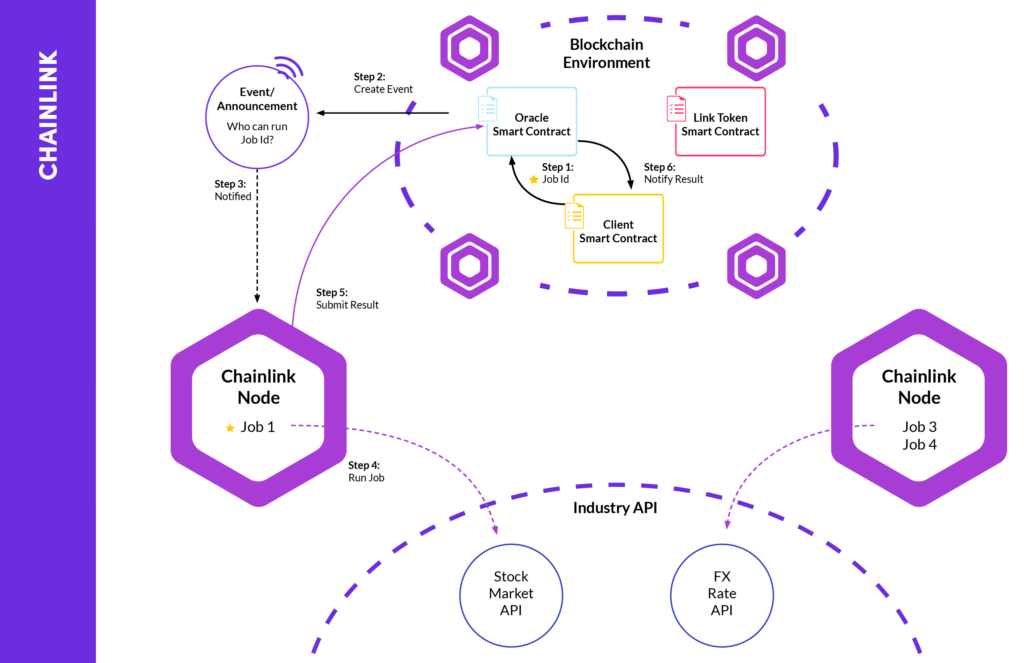-
Chainlink Runtime Environment (CRE) connects traditional finance systems with blockchain protocols, enabling seamless interoperability.
-
CRE facilitates the adoption of blockchain by legacy financial institutions without disrupting existing processes.
-
In Africa, CRE supports financial inclusion by addressing challenges like access to banking, high transaction costs, and inefficient remittance systems.
In an era where blockchain has slowly dominated major industries, the Chainlink Runtime Environment (CRE) emerges as a pivotal framework that connects traditional financial systems with blockchain protocols.
Interoperability between legacy institutions and decentralized finance (DeFi) has never been more crucial. This integration is particularly significant for Africa, a continent poised to leverage blockchain technology for enhanced financial inclusion and economic growth.
Chainlink CRE: The Key to Affordable and Inclusive Financial Services in Africa
What is the Chainlink Runtime Environment?
CRE is a progressive innovation in financial structure integration, providing companies with a comprehensive framework to link current fee infrastructures with blockchain protocols seamlessly.
CRE’s groundbreaking abilities build upon COBOL standard requirements—the cornerstones of electronic banking since its inception. CRE seeks to modernize transaction tactics, replacing outdated structures like Java Runtime Environment (JRE), which has long dominated online banking programs since the 1990s.

Switching over to the Chainlink Runtime Environment doesn’t simply constitute an improvement; it marks an integrated Web3-ready finance enterprise. As organizations navigate this complicated panorama, CRE may additionally be instrumental in supporting green and steady transactions tailored specifically for the next day’s digital economy.
The Chainlink Runtime Environment’s true strength lies in its ability to allow traditional financial systems to interact with blockchain protocols while continuing with legacy systems, like SWIFT’s messaging protocol alongside blockchain networks.
An excellent illustration of this potential can be seen through the recent integration of both. Financial systems utilizing outdated systems will find adopting blockchain technology more palatable when employing frameworks such as CRE to enable innovation without jeopardizing current processes.
The Role of Chainlink in Financial Inclusion and Economic Growth in Africa
The implementation of the Chainlink Runtime Environment has the potential to revolutionize financial inclusion across Africa. Millions are unbanked or underbanked; using blockchain protocols could offer secure yet affordable access to essential services—particularly those located far from traditional bank infrastructure.
Also, Read: Blockchain Interoperability Made Safer With Chainlink’s Transporter
The CRE initiative aims to offer brand-new and progressive economic services tailored specifically to marginalized populations. This, in turn, results in top-notch employment among diverse communities, similarly increasing a country’s economic foothold.
Africa stands at a pivotal point where decentralized finance (DeFi) solves numerous hurdles, including an increase in cross-border payments and remittances.
By taking advantage of interoperability via frameworks like CRE, organizations can reduce transaction costs while increasing efficiency—two crucial characteristics considering Africa’s diverse economies. This approach can reduce transaction fees associated with cross-border dealings while speeding access to capital across regions.
Privacy and Security: Ensuring Trust in Blockchain for Enterprise
Historically, privacy concerns have hindered large enterprises from fully embracing blockchain technologies—particularly sectors such as finance and healthcare that handle sensitive data regularly. By introducing tools like Chainlink’s Blockchain Privacy Manager, businesses can now engage with blockchain without exposing critical corporate information publicly.
Additionally, the introduction of private transactions through Chainlink’s Cross-Chain Interoperability Protocol (CCIP) ensures that sensitive operations occur securely within decentralized environments.
This advancement addresses one of the primary barriers preventing widespread adoption among enterprises looking towards innovative solutions like those offered by CRE.
Chainlink and the Future of Web3 in Africa
As developers and startups across Africa look toward building custom solutions using tools provided by the Chainlink Runtime Environment, they find themselves equipped to tackle local challenges—be it agriculture or supply chain management issues.
All while creating tailored financial products suited specifically for African markets. Encouraging entrepreneurship within this ecosystem allows innovators not only access but also participation within DeFi initiatives capable of transforming business models across various sectors throughout Africa.
With initiatives such as Chainlink’s runtime environment paving pathways forward, there exists immense potential for African countries to position themselves at the forefront of global Web3 adoption strategies, focusing on regulatory innovation supporting smart city development alongside cross-border trade enhancements driven by advanced technologies stemming from integrations seen today.
The Growing Impact of Chainlink on Financial Institutions
A notable example showcasing these advancements includes Chainlink’s pilot program involving SWIFT & UBS testing tokenized fund settlements—demonstrating how conventional setups may interact harmoniously within digital economies devoid of reliance solely upon cryptocurrencies altogether.
Such programs offer insights into possibilities that are applicable even locally—for instance, initiating similar trials across Kenyan or Nigerian markets that are already exploring blockchains’ capabilities surrounding international commerce.
Potential case studies highlight further opportunities available wherein leveraging tools offered through platforms such as CRE could improve overall infrastructure significantly.
This also includes establishing effective remittance channels connecting diaspora members back home or developing land registries utilizing blockchains, reducing fraud risks, and enhancing smallholder farmers’ accessibility towards capital acquisition processes efficiently.
The Path Forward for Africa’s Blockchain Future
Achieving meaningful progress ahead requires collaboration among developers and stakeholders, including governments and communities, collectively engaging together and discussing how implementations revolving around innovations presented via platforms like Chainlink’s runtime environment contribute positively towards advancing digital transformations occurring throughout our continent.
